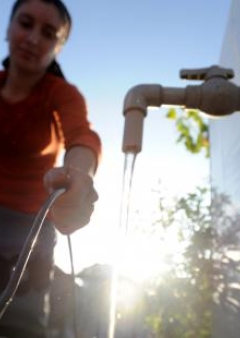
A Thirst for Change: An Evaluation of the World Bank Group’s Support for Water Supply and Sanitation with Focus on the Poor
The World Bank Group provided $30.3 billion for Water and Sanitation Services to client countries during FY2007-16. The World Bank accounted for the largest share with $28.4 billion (93 percent), followed by the International Finance Corporation (IFC) with $1.5 billion (5 percent), and the Multilateral Investment Guarantee Agency (MIGA) with $0.4 billion (2 percent).
Lack of financial viability and accountability of service providers are at the core of gaps and disparities in global water and sanitation services, and the World Bank Group’s response has been inadequate. Only 4 percent of the Bank’s water and sanitation-related projects declared financial viability as an explicit objective. While 71 percent of evaluated projects report moderately satisfactory or better development outcomes, over 40 percent of these projects face significant or high risk to their outcomes, mainly due to lack of financial viability, diluting the impact of the nearly $30 billion of World Bank Group’s finance for this sector during 2007-16.
Securing financial viability and institutional accountability is also crucial to attract much needed investments into the water and sanitation service sector, including private sector finance. Of the $30 billion of WBG’s support for WSS during 2007-16, IFC and MIGA account for only 5 percent and 2 percent, respectively. . This presents a formidable challenge for the successful application of the World Bank’s new “Cascade Approach” to the sector.
The water and sanitation services sector faces cross-sectoral challenges that are approaching crisis proportions in many areas, but the World Bank Group has not developed yet a systematic response to address such challenges. Competing demand for water resources from agriculture and industry, climate change, pollution of water bodies (which are the very source of water supply) from untreated wastewater, and poorly managed solid waste and industrial effluents, present a formidable set of interrelated development challenges. With a few exceptions, the concerned Global Practices in the World Bank Group are not sufficiently coordinating their efforts to address these issues, or to support client governments to deal with them in a systematic manner.
Without tackling financial viability and cross-sectoral impacts head-on, credible progress towards SDG 6 is unlikely. SDG 6 has raised the bar from simple access to water supply and sanitation to universal access to adequate, reliable, safe and affordable service delivery by 2030. To effectively support client countries, move towards SDG 6, the Bank Group must help develop solutions to the issues of financial viability, institutional accountability and cross-sectoral impacts. Currently, there are few sustainable models for addressing these issues in fast developing low-income and low middle-income countries, for example.
IEG’s evaluation also highlights pioneering and successful initiatives by the Bank in the Water and Sanitation Services sector in several countries. The challenge is to replicate these positive experiences elsewhere. Bank projects in Brazil and Morocco have helped improve WSS utility performance and accountability, and facilitated private sector participation in Colombia. Community-based rural WSS has been mainstreamed in several countries with positive results, and decentralized cell phone-based M&E systems in Indonesia have promoted service provider accountability. Bank projects have helped Mexico and Brazil deal with extreme water stress situations and are helping Argentina, Egypt and India with reducing the impact of wastewater on water bodies.
